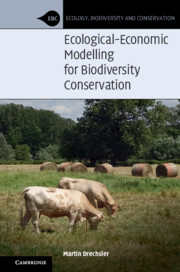Book contents
- Ecological-Economic Modelling for Biodiversity Conservation
- Ecology, Biodiversity and Conservation
- Ecological-Economic Modelling for Biodiversity Conservation
- Copyright page
- Contents
- Preface
- Acknowledgements
- Part I Modelling
- Part II Ecological Modelling
- Part III Economic Modelling
- 9 Instruments for Biodiversity Conservation
- 10 Game Theory
- 11 Incentive Design
- 12 Modelling Human Decisions
- 13 The Agglomeration Bonus
- Part IV Ecological-Economic Modelling
- References
- Index
12 - Modelling Human Decisions
from Part III - Economic Modelling
Published online by Cambridge University Press: 29 February 2020
- Ecological-Economic Modelling for Biodiversity Conservation
- Ecology, Biodiversity and Conservation
- Ecological-Economic Modelling for Biodiversity Conservation
- Copyright page
- Contents
- Preface
- Acknowledgements
- Part I Modelling
- Part II Ecological Modelling
- Part III Economic Modelling
- 9 Instruments for Biodiversity Conservation
- 10 Game Theory
- 11 Incentive Design
- 12 Modelling Human Decisions
- 13 The Agglomeration Bonus
- Part IV Ecological-Economic Modelling
- References
- Index
Summary
An important component in the analysis of policy instruments is the modelling of human behaviour. In the previous chapters, humans are (usually) considered as rational and perfectly informed profit-maximisers. This assumption is gradually relaxed in the present chapter. The first section addresses the issues of decreasing marginal utility, multiple objectives and time preference. The following section adds the problem of risk and uncertainty and presents a standard economic model for decision making under risk. The assumption of selfish profit maximisation is relaxed subsequently by introducing a model of fairness and inequity aversion. The following sections present approaches for modelling situations of imperfect information and limited cognitive abilities, as well as learning and behavioural change. The concluding section discusses and provides some linkages to Chapter 7 on individual-based models and provides some references from the literature on agent-based modelling.
Keywords
- Type
- Chapter
- Information
- Ecological-Economic Modelling for Biodiversity Conservation , pp. 158 - 180Publisher: Cambridge University PressPrint publication year: 2020



